Abstract
It is generally accepted that Selenium (Se) is necessary for optimum performance of the immune system. Selenium deficiency results in immune suppression but little is known concerning the effect of excess Se on immune function. Recent evidence suggests that oral Se supplementation may impede oncogenesis, but the mechanism of this action is currently unknown. Conversely, under certain conditions, Se is suspected of promoting neoplasia. The studies described herein delineate the effects of excess Se (0.5, 2.0 or 5.0 p.p.m.) on specific immune functions of Se-adequate rats, namely, antibody synthesis, delayed-type hypersensitivity (DTH), natural killer (NK) cell activity, prostaglandin E2 (PGE2) synthesis, and interleukin 1 (IL-1) activity. Selenium administered to female Sprague-Dawley rats for 10 weeks at 0.5 and 2.0 p.p.m. resulted in significant (P less than or equal to 0.01) enhancement of splenic NK activity while the NK response in the 5.0 p.p.m. Se-treated rats was equivalent to the non-Se-treated controls. Conversely, the DTH response was significantly (P less than or equal to 0.01) suppressed at all three dosages while antibody synthesis and prostaglandin E2 activity were significantly (P less than or equal to 0.05) reduced compared to the controls at the highest dosage of Se. IL-1 activity was unaffected by Se exposure. These data could partially explain the contradictory oncogenic characteristics of Se. For instance, tumours that are NK sensitive could be prevented and/or responsive to Se therapy, while NK insensitive neoplasms could be enhanced by Se supplementation due to the impaired function of both humoral and cell-mediated immunity.
Full text
PDF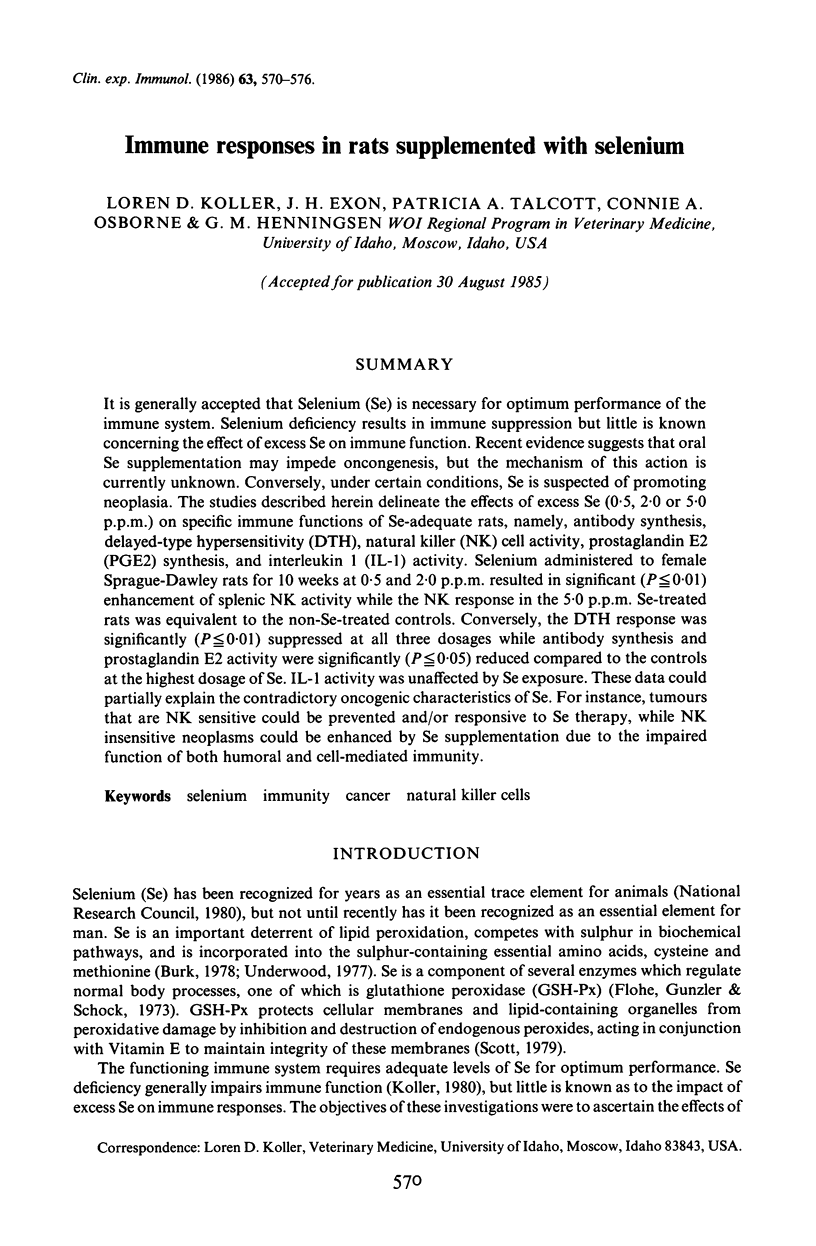
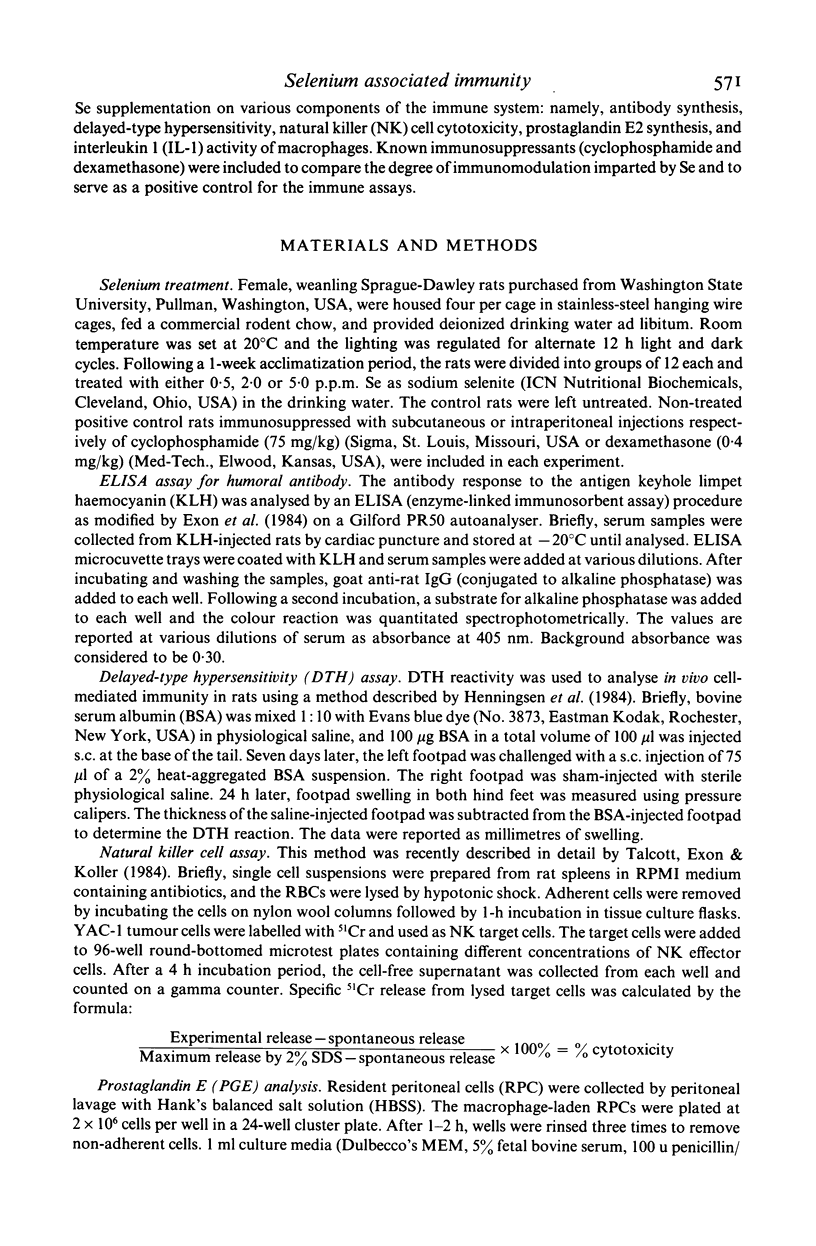
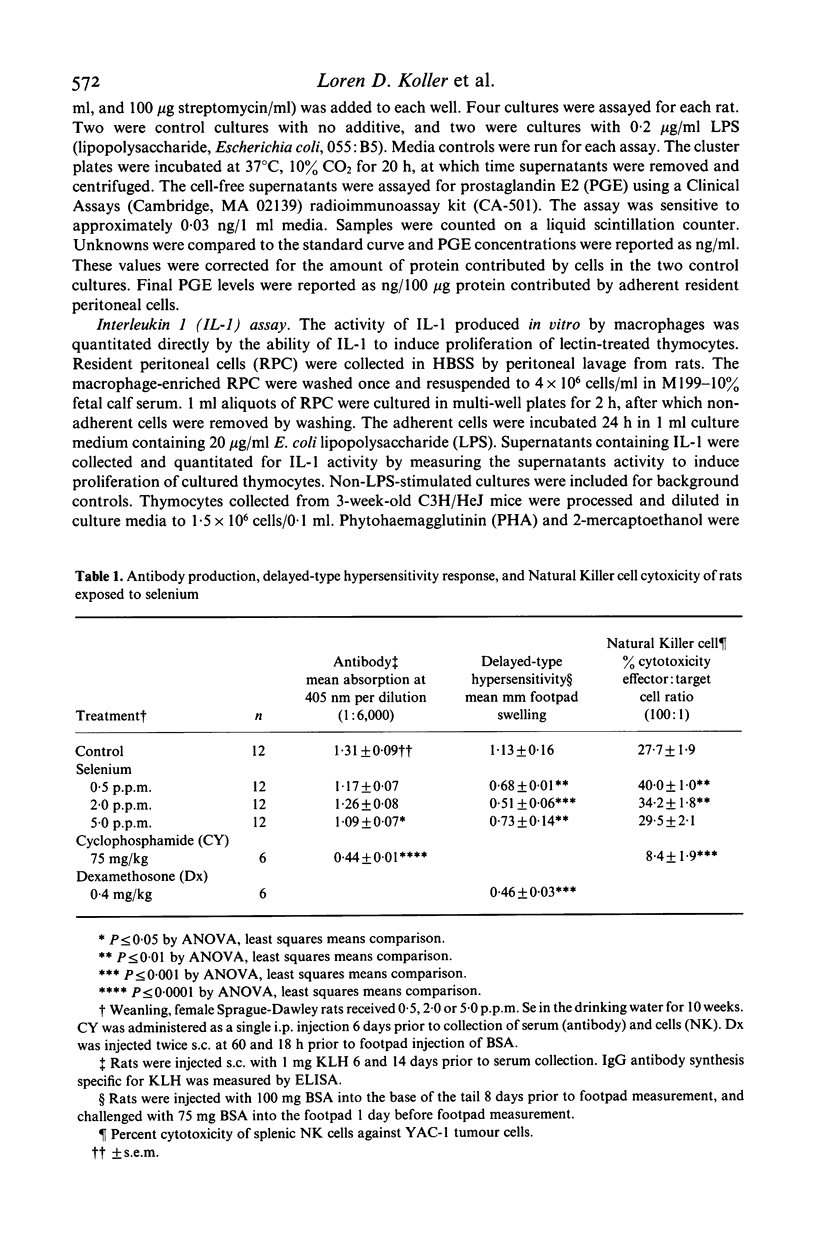
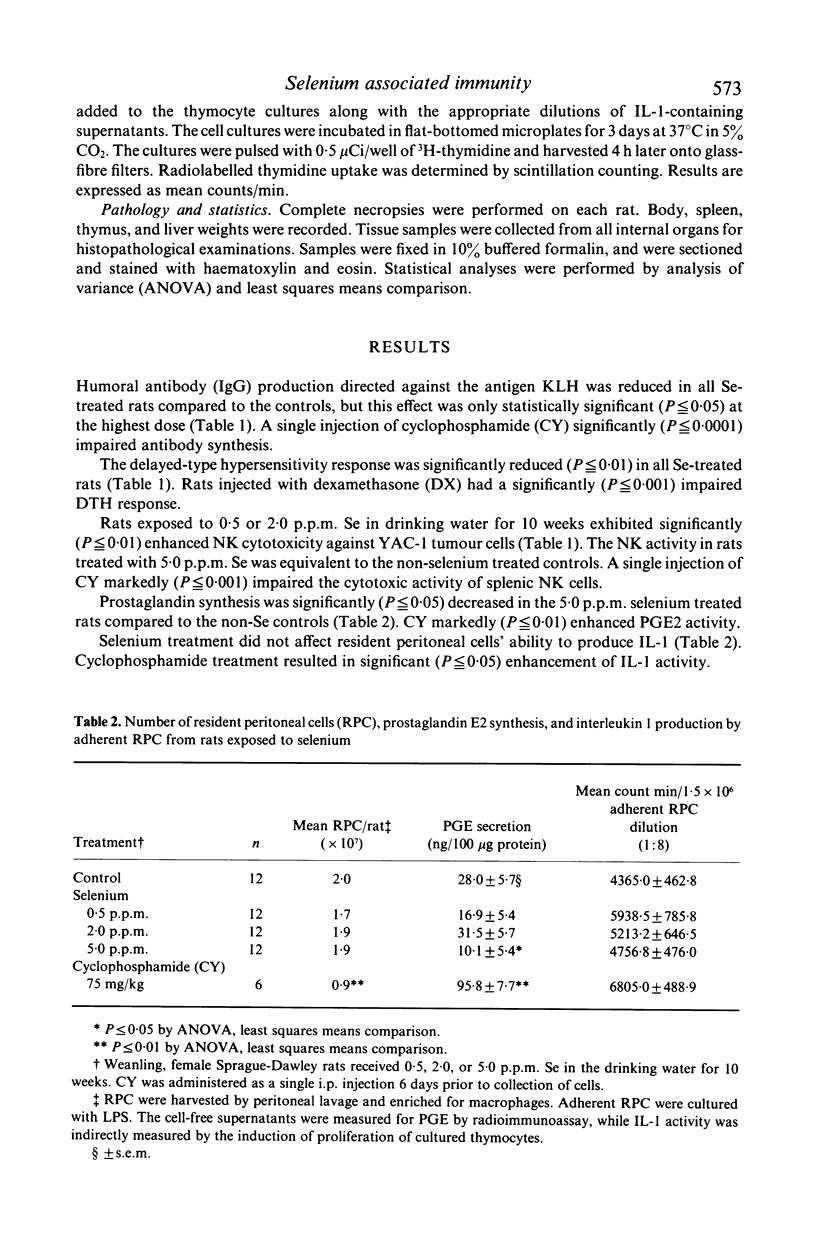
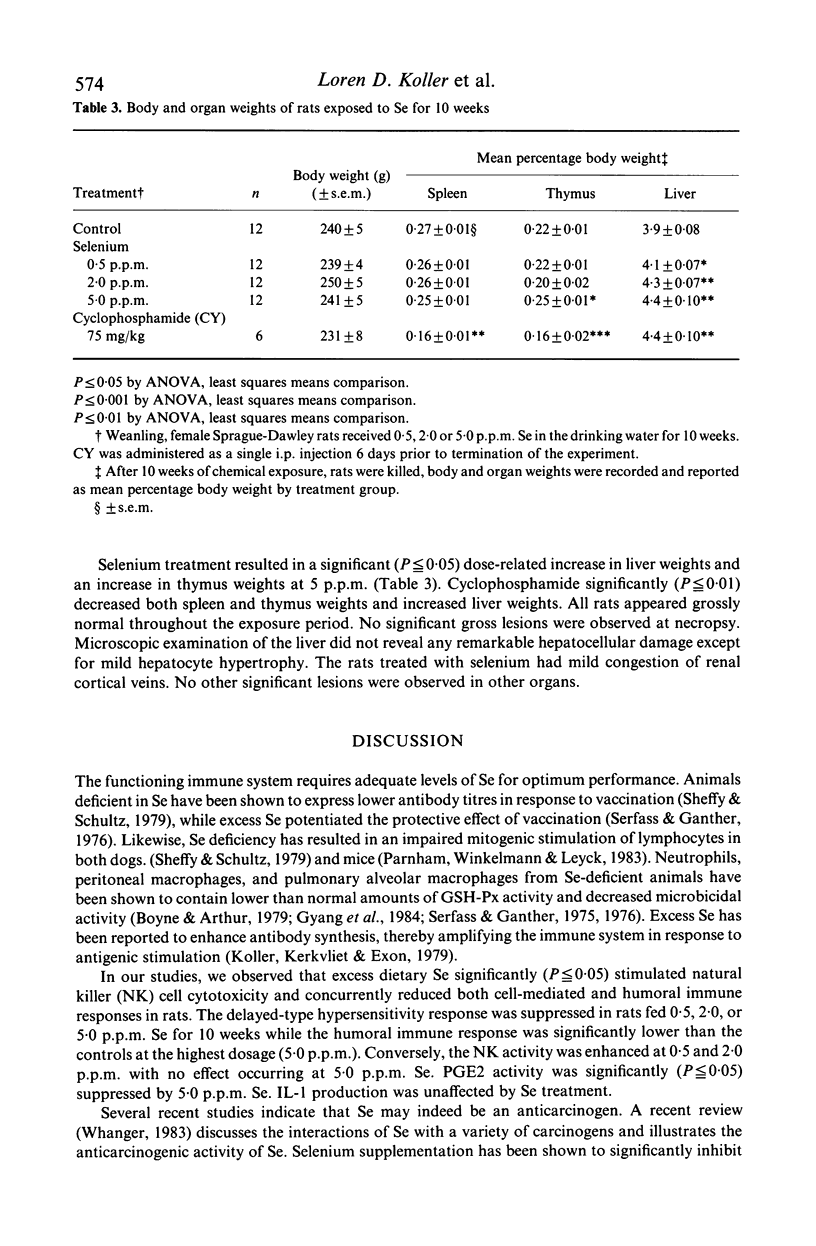
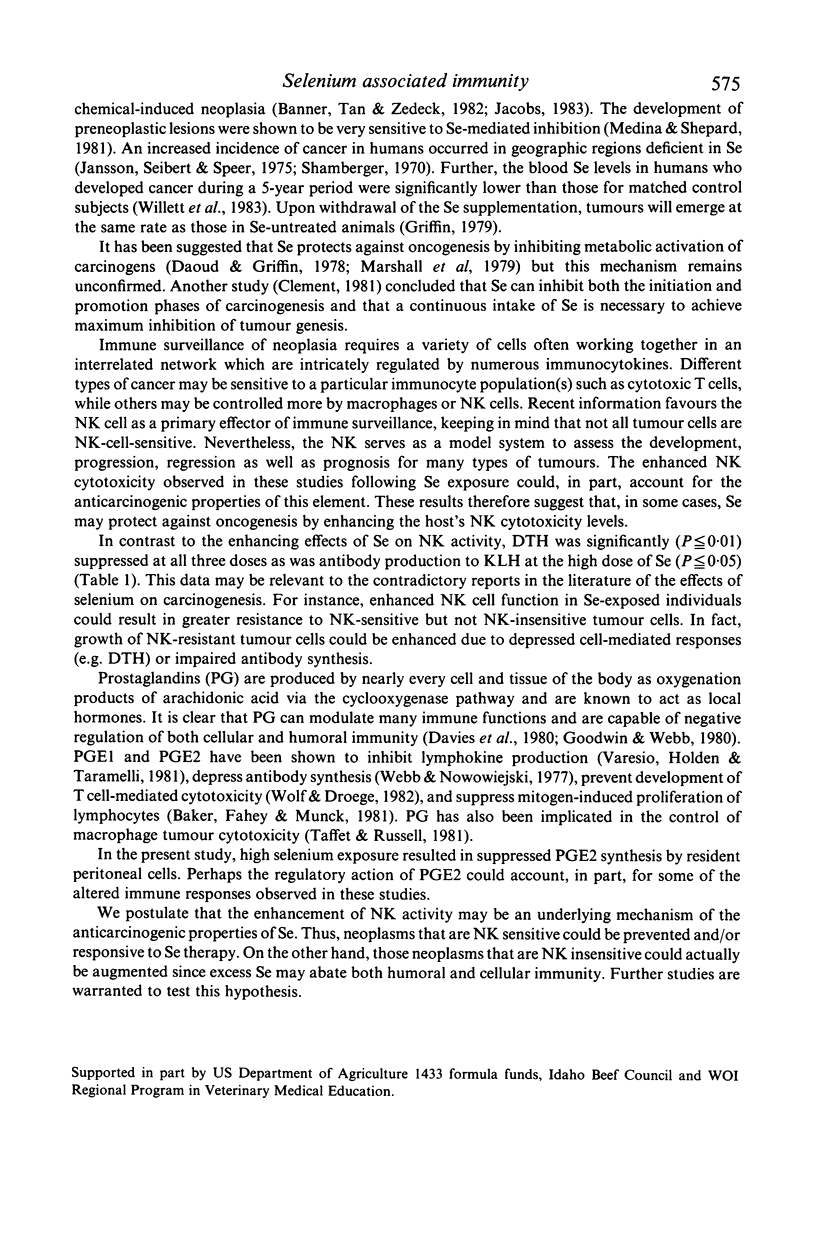
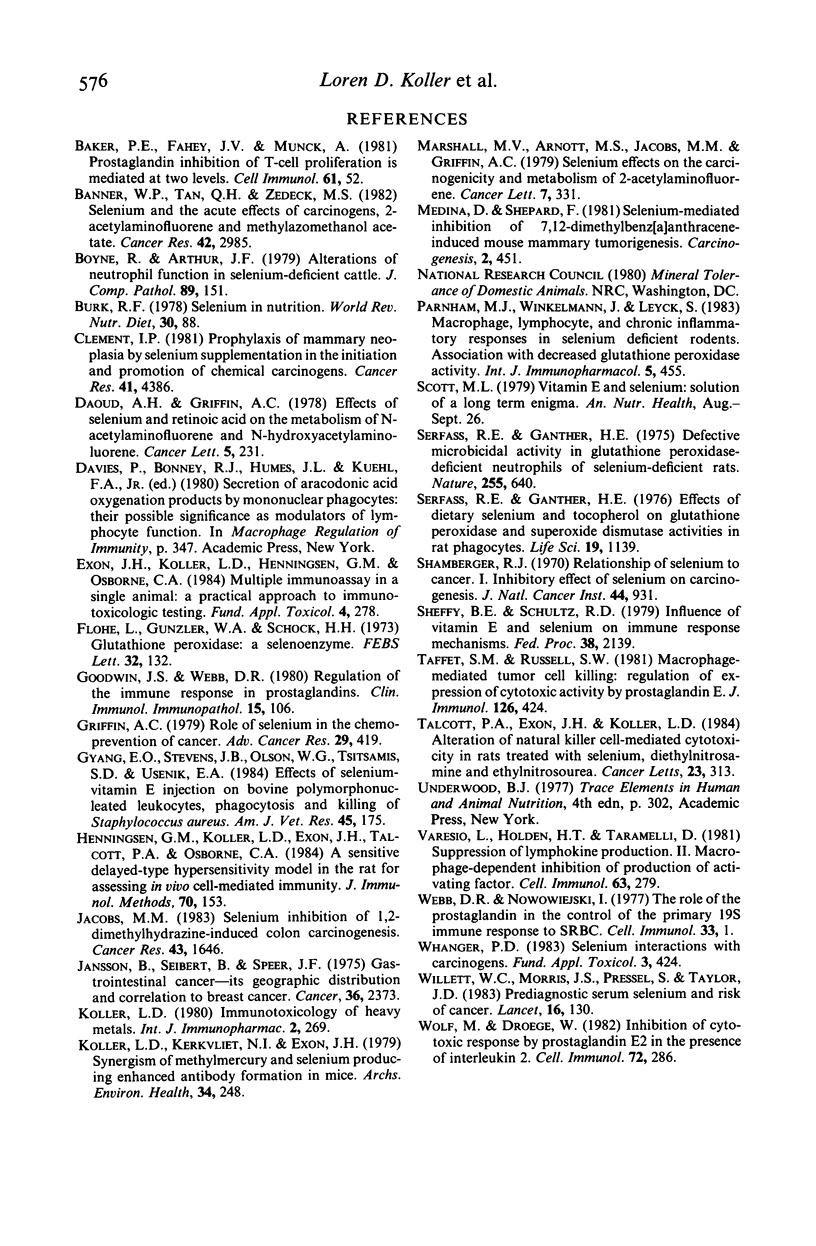
Selected References
These references are in PubMed. This may not be the complete list of references from this article.
- Baker P. E., Fahey J. V., Munck A. Prostaglandin inhibition of T-cell proliferation is mediated at two levels. Cell Immunol. 1981 Jun;61(1):52–61. doi: 10.1016/0008-8749(81)90353-1. [DOI] [PubMed] [Google Scholar]
- Banner W. P., Tan Q. H., Zedeck M. S. Selenium and the acute effects of the carcinogens, 2-acetylaminofluorene and methylazoxymethanol acetate. Cancer Res. 1982 Aug;42(8):2985–2989. [PubMed] [Google Scholar]
- Boyne R., Arthur J. R. Alterations of neutrophil function in selenium-deficient cattle. J Comp Pathol. 1979 Jan;89(1):151–158. doi: 10.1016/0021-9975(79)90018-5. [DOI] [PubMed] [Google Scholar]
- Burk R. F. Selenium in nutrition. World Rev Nutr Diet. 1978;30:88–106. doi: 10.1159/000401237. [DOI] [PubMed] [Google Scholar]
- Daoud A. H., Griffin A. C. Effects of selenium and retinoic acid on the metabolism of N-acetylaminofluorene and N-hydroxyacetylamino-fluorene. Cancer Lett. 1978 Oct;5(4):231–237. doi: 10.1016/s0304-3835(78)80045-7. [DOI] [PubMed] [Google Scholar]
- Exon J. H., Koller L. D., Henningsen G. M., Osborne C. A. Multiple immunoassay in a single animal: a practical approach to immunotoxicologic testing. Fundam Appl Toxicol. 1984 Apr;4(2 Pt 1):278–283. doi: 10.1016/0272-0590(84)90129-5. [DOI] [PubMed] [Google Scholar]
- Flohe L., Günzler W. A., Schock H. H. Glutathione peroxidase: a selenoenzyme. FEBS Lett. 1973 May 15;32(1):132–134. doi: 10.1016/0014-5793(73)80755-0. [DOI] [PubMed] [Google Scholar]
- Goodwin J. S., Webb D. R. Regulation of the immune response by prostaglandins. Clin Immunol Immunopathol. 1980 Jan;15(1):106–122. doi: 10.1016/0090-1229(80)90024-0. [DOI] [PubMed] [Google Scholar]
- Griffin A. C. Role of selenium in the chemoprevention of cancer. Adv Cancer Res. 1979;29:419–442. doi: 10.1016/s0065-230x(08)60851-9. [DOI] [PubMed] [Google Scholar]
- Gyang E. O., Stevens J. B., Olson W. G., Tsitsamis S. D., Usenik E. A. Effects of selenium-vitamin E injection on bovine polymorphonucleated leukocytes phagocytosis and killing of Staphylococcus aureus. Am J Vet Res. 1984 Jan;45(1):175–177. [PubMed] [Google Scholar]
- Henningsen G. M., Koller L. D., Exon J. H., Talcott P. A., Osborne C. A. A sensitive delayed-type hypersensitivity model in the rat for assessing in vivo cell-mediated immunity. J Immunol Methods. 1984 May 25;70(2):153–165. doi: 10.1016/0022-1759(84)90181-9. [DOI] [PubMed] [Google Scholar]
- Ip C. Prophylaxis of mammary neoplasia by selenium supplementation in the initiation and promotion phases of chemical carcinogenesis. Cancer Res. 1981 Nov;41(11 Pt 1):4386–4390. [PubMed] [Google Scholar]
- Jacobs M. M. Selenium inhibition of 1,2-dimethylhydrazine-induced colon carcinogenesis. Cancer Res. 1983 Apr;43(4):1646–1649. [PubMed] [Google Scholar]
- Jansson B., Seibert B., Speer J. F. Gastrointestinal cancer. Its geographic distribution and correlation to breast cancer. Cancer. 1975 Dec;36(6 Suppl):2373–2384. doi: 10.1002/1097-0142(197512)36:6<2373::aid-cncr2820360616>3.0.co;2-n. [DOI] [PubMed] [Google Scholar]
- Koller L. D. Immunotoxicology of heavy metals. Int J Immunopharmacol. 1980;2(4):269–279. doi: 10.1016/0192-0561(80)90027-2. [DOI] [PubMed] [Google Scholar]
- Koller L. D., Isaacson-Kerkvliet N., Exon J. H., Brauner J. A., Patton N. M. Synergism of methylmercury and selenium producing enhanced antibody formation in mice. Arch Environ Health. 1979 Jul-Aug;34(4):248–252. doi: 10.1080/00039896.1979.10667408. [DOI] [PubMed] [Google Scholar]
- Marshall M. V., Arnott M. S., Jacobs M. M., Griffin A. C. Selenium effects on the carcinogenicity and metabolism of 2-acetylaminofluorene. Cancer Lett. 1979 Oct;7(6):331–338. doi: 10.1016/s0304-3835(79)80062-2. [DOI] [PubMed] [Google Scholar]
- Medina D., Shepherd F. Selenium-mediated inhibition of 7,12-dimethylbenz[a]anthracene-induced mouse mammary tumorigenesis. Carcinogenesis. 1981;2(5):451–455. doi: 10.1093/carcin/2.5.451. [DOI] [PubMed] [Google Scholar]
- Parnham M. J., Winkelmann J., Leyck S. Macrophage, lymphocyte and chronic inflammatory responses in selenium deficient rodents. Association with decreased glutathione peroxidase activity. Int J Immunopharmacol. 1983;5(5):455–461. doi: 10.1016/0192-0561(83)90022-x. [DOI] [PubMed] [Google Scholar]
- Serfass R. E., Ganther H. E. Defective microbicidal activity in glutathione peroxidase-deficient neutrophils of selenium-deficient rats. Nature. 1975 Jun 19;255(5510):640–641. doi: 10.1038/255640a0. [DOI] [PubMed] [Google Scholar]
- Serfass R. E., Ganther H. E. Effects of dietary selenium and tocopherol on glutathione peroxidase and superoxide dismutase activities in rat phagocytes. Life Sci. 1976 Oct 15;19(8):1139–1144. doi: 10.1016/0024-3205(76)90248-4. [DOI] [PubMed] [Google Scholar]
- Shamberger R. J. Relationship of selenium to cancer. I. Inhibitory effect of selenium on carcinogenesis. J Natl Cancer Inst. 1970 Apr;44(4):931–936. [PubMed] [Google Scholar]
- Sheffy B. E., Schultz R. D. Influence of vitamin E and selenium on immune response mechanisms. Fed Proc. 1979 Jun;38(7):2139–2143. [PubMed] [Google Scholar]
- Taffet S. M., Russell S. W. Macrophage-mediated tumor cell killing: regulation of expression of cytolytic activity by prostaglandin E. J Immunol. 1981 Feb;126(2):424–427. [PubMed] [Google Scholar]
- Talcott P. A., Exon J. H., Koller L. D. Alteration of natural killer cell-mediated cytotoxicity in rats treated with selenium, diethylnitrosamine and ethylnitrosourea. Cancer Lett. 1984 Jul;23(3):313–322. doi: 10.1016/0304-3835(84)90099-5. [DOI] [PubMed] [Google Scholar]
- Varesio L., Holden H. T., Taramelli D. Suppression of lymphokine production: II. Macrophage-dependent inhibition of production of macrophage activating factor. Cell Immunol. 1981 Sep 15;63(2):279–292. doi: 10.1016/0008-8749(81)90007-1. [DOI] [PubMed] [Google Scholar]
- Webb D. R., Nowowiejski I. The role of prostaglandins in the control of the primary 19S immune response to sRBC. Cell Immunol. 1977 Sep;33(1):1–10. doi: 10.1016/0008-8749(77)90129-0. [DOI] [PubMed] [Google Scholar]
- Whanger P. D. Selenium interactions with carcinogens. Fundam Appl Toxicol. 1983 Sep-Oct;3(5):424–430. doi: 10.1016/s0272-0590(83)80016-5. [DOI] [PubMed] [Google Scholar]
- Willett W. C., Polk B. F., Morris J. S., Stampfer M. J., Pressel S., Rosner B., Taylor J. O., Schneider K., Hames C. G. Prediagnostic serum selenium and risk of cancer. Lancet. 1983 Jul 16;2(8342):130–134. doi: 10.1016/s0140-6736(83)90116-2. [DOI] [PubMed] [Google Scholar]
- Wolf M., Droege W. Inhibition of cytotoxic responses by prostaglandin E2 in the presence of interleukin 2. Cell Immunol. 1982 Sep 15;72(2):286–293. doi: 10.1016/0008-8749(82)90476-2. [DOI] [PubMed] [Google Scholar]


